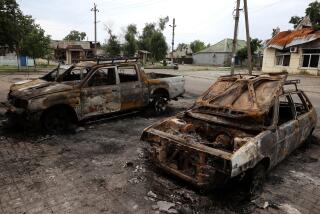Use Neutron Bomb on the Iraqis? : War: Rather than get bogged down in another inconclusive conventional war, U.S. should consider a more discriminating and effective weapon.
- Share via
Since World War II, the United States has been involved in two major conventional wars in Asia, both of politically and economically disastrous. Thus the wisdom of getting involved in another in the Middle East is open to serious question. Were this to happen, President Bush, as was the case with Presidents Lyndon B. Johnson (Vietnam) and Harry S. Truman (Korea), might be prematurely retired by a disgruntled American electorate, leaving behind an economy badly battered by a costly conventional war. This need not happen if the United States were to base its strategy for war with Iraq on the neutron bomb.
When the neutron-bomb concept was devised in 1958, its possible use in NATO defenses was not uppermost in defense-planners’ minds. Rather, the bomb was envisioned as a weapon for use in Asian ground wars, where any potential opponent lacked a nuclear-response capability. In such circumstances, the neutron bomb, which uses an instantaneous burst of nuclear radiation to incapacitate enemy personnel without destructive blast and heat effects, represented an extremely potent battlefield weapon. It is vastly more effective and far more discriminating than conventional weapons. And it would enable a quick military victory at a far smaller cost in American lives and national treasure.
This possibility led to the highest priority being assigned to the development of the weapon. In the early 1960s, a series of successful tests at the nuclear test site in Nevada were conducted. Subsequently, it was proposed that neutron weapons be produced and stockpiled. But the proposal was rejected out of hand by the Defense Department. Meantime, the United States entered into and suffered the consequences of the Vietnam War.
Which brings us to the possibility of a major ground war with Iraq. For the precise reasons--battlefield effectiveness at minium cost to U.S. lives and treasure--that led to its development, the neutron bomb’s time may be at hand. Bush might wish to include it as a military option before he commits even more ground forces to the Persian Gulf.
In 1981, President Ronald Reagan ordered the stockpiling of neutron weapons, including hundreds of artillery shells that could be delivered by eight-inch cannons. Because of West Germany’s refusal to accept these weapons, they were stored in sites in the United States.
Today these artillery shells would be ideally suited for use against Iraq’s armored forces. Such a capability could be achieved by deploying artillery units with nuclear-trained crews to Saudi Arabia. These units are capable of firing conventional rounds as well as nuclear. Delivery of the neutron shells to Saudi Arabia could occur within a day’s time, if the President so ordered.
Such a deployment, should it take place, must be announced openly, to send a clear message to Iraq about the seriousness of U.S. intentions. What’s important is that the threat of such use could deter an attack from occurring.
No doubt, civilized nations would bitterly condemn the United States for again turning to nuclear weapons, in this case, the neutron bomb. But perhaps these nations should contemplate the economic chaos and social misery that could result from Iraqi President Saddam Hussein dominating the world’s oil supplies.
Aside from world opinion, however, there is a far more important issue for the United States to weigh--how to balance its choice of weapons to win a war quickly versus the domestic political and economic consequences of fighting a war that goes on interminably and inconclusively. An already strained American economy might not hold up well under another large, protracted conventional ground war. Thus the United States might want to come down on the nuclear side--in favor of the neutron bomb.
More to Read
Sign up for Essential California
The most important California stories and recommendations in your inbox every morning.
You may occasionally receive promotional content from the Los Angeles Times.













